

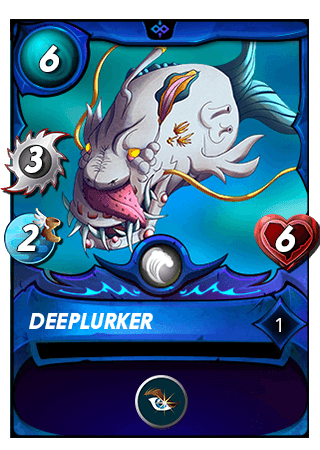
It swims; It skulks; It strikes! It’s the Deeplurker!
When using the water splinter, the Deeplurker is a starter-card staple. This 6-mana card with its 2-speed, 6-health and bruising, 3-melee attack is the opportunistic wrecking ball of the deep! When summoned by Kelya Frendul, who adds +1 armor and +1 speed, the Deeplurker scarfs down low-health opponents quicker than a toddler gobbles goldfish crackers.
In bronze-league battles, the Deeplurker is one of the main reasons that water douses fire. Paired with Frendul, the Deeplurker is as fast as fire’s Serpentine Spy, allowing it the possibility of snuffing out the Spy before it even acts. But either way, the low-health, fire fighter is often long gone while the Deeplurker continues to turn the fire team into smoldering rubble.
At level 6, the Deeplurker gains the poison ability, and at level 10 it gains the demoralize ability. Both of these abilities make it even more deadly at higher levels.


I used the Deeplurker in a 28-mana match. As it was the beginning of the season, I was reset into the bronze-III league where all matches have standard rules and all splinters are allowed.
My opponent had an eclectic mix of splinters in his last five matches which were all low-mana to boot. So, I really didn’t have any read on what he might play. But, I am always aware that amped up magic (earth) and amped up archers (life) are always possibilities in higher mana matches.
As a final note, I had just drawn the water daily quest. So, I decided to sail a water team out into the unknown reaches of this battle.

Thinking I would probably face magic or archers, I stacked the front of my team with health and armor and the back of my team with backfield attackers, hoping to hold off a frontal assault long enough to thin out my opponent’s team. Although, I acknowledge that water teams don’t usually hold up so well against life and earth. But not really knowing what would be played against me and having a water daily quest, I took a shot with a splinter I might not have chosen otherwise.


I chose Kelya Frendul as my summoner. While Bortus would have totally been the way to go if I suspected I was facing magic, Kelya is the choice in all other cases. So just playing the odds I used Kelya—the more common choice down in the bronze leagues.
For my tank I used the Diemonshark. With it’s summoner's bonus adjusted 7-armor, 7-health it can withstand a little magic and twice as much archer fire.
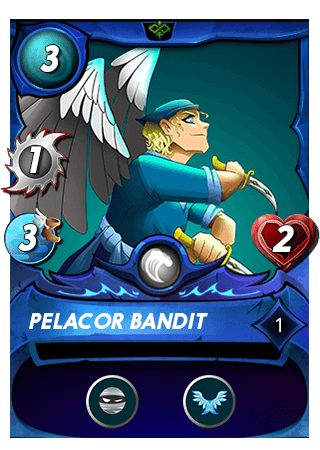
In third position I placed the Feasting Seaweed, wanting his good attack power and opportunity ability to continue to work on my opponent’s backfield.
Fourth in line stands the Merdaali Guardian. Simply a tank healer, its job is to let my front two hold the line a little bit longer. Naturally I chose to restore health over armor because I wasn’t confident that I wouldn’t be facing magic.
Guarding my rear flank is the Pelacor Bandit. I don’t see this reward card played very often in bronze-league matches, and I don’t know why. I love this card. It will give me a little more reach into my opponent’s backfield, and with its swiftness and flying ability it is capable of holding off sneaks as well. And if my opponent plays life, which I believe is highly likely, there is always the possibility that the slow Stitch Leech will make his team.

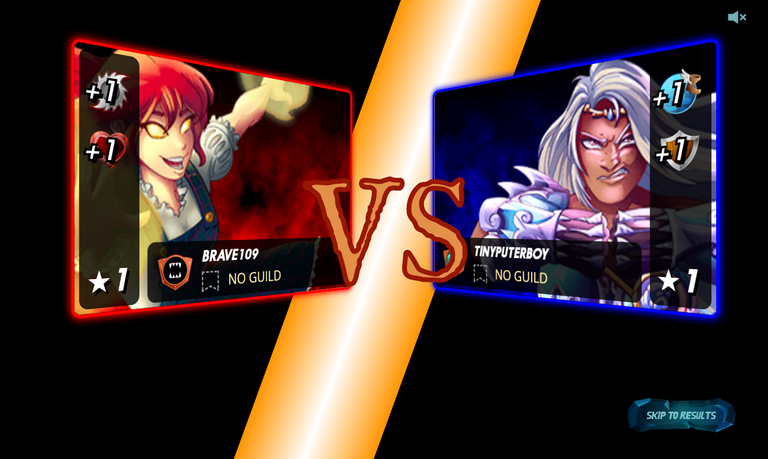
Fire! Call me surprised, and call me tinyputer-luckyboy! I didn't draw an expected team; I did better. Water douses fire, and I’m suddenly confident that I will win this match.
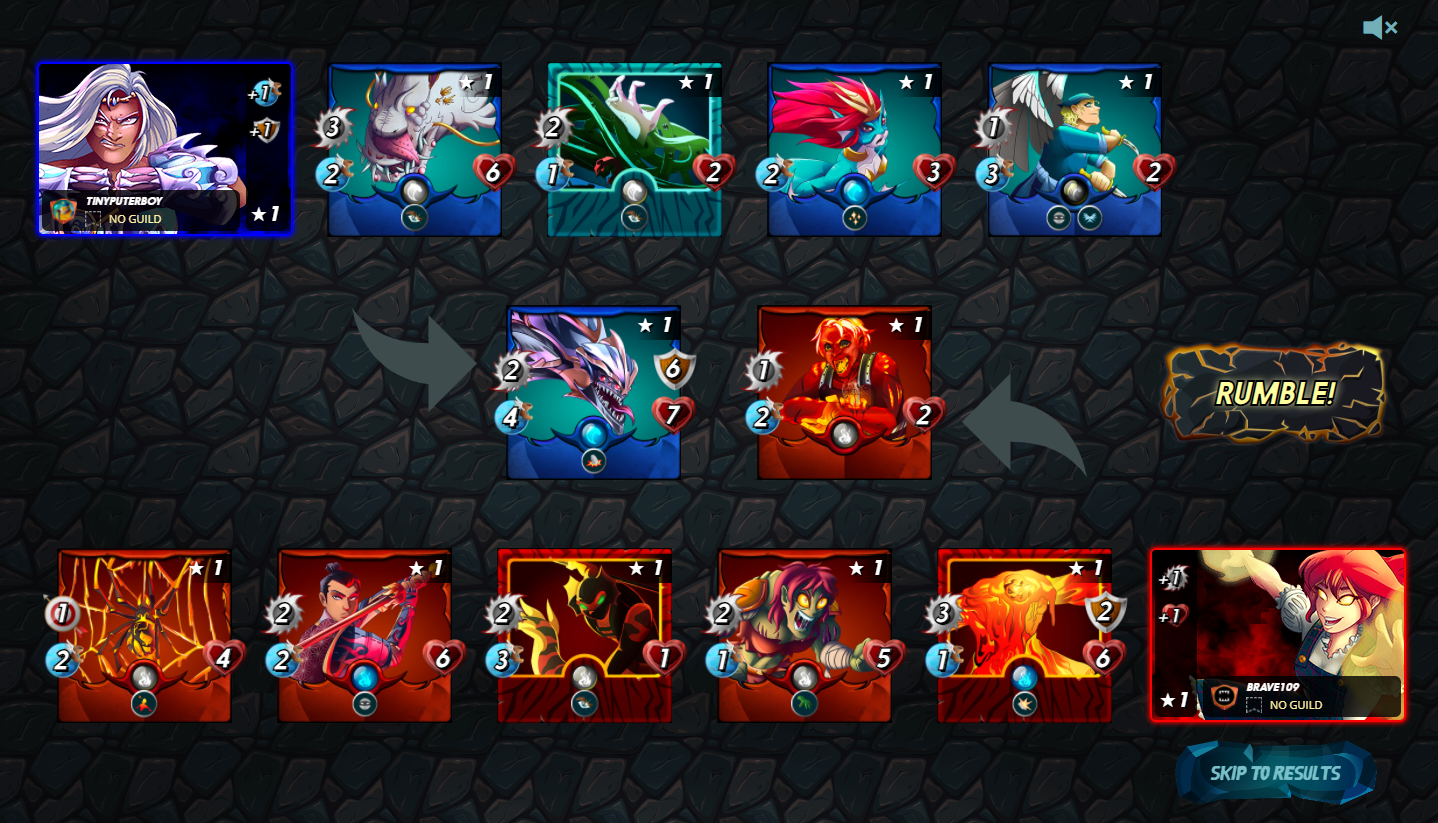
Seeing the full teams, applying summoners' bonuses and looking into the future, I am liking what I am seeing here. In round one, my front two will take down his cannon-fodder tank. His Spy will get a lick in, but it will do little more than strip the armor from my Seaweed, who will promptly return the favor with a 90-percent chance of reducing that Serpentine guy to ashes. At which point, fire is always at a disadvantage.
The real concern looking forward is if my opponent’s true front two will buck the odds and land a few powerful strikes against my tank, or if my Diemonshark’s speed will keep him safe and sound.
How did it turn out? See for yourself here.

This match is a classic speed vs. strength battle.

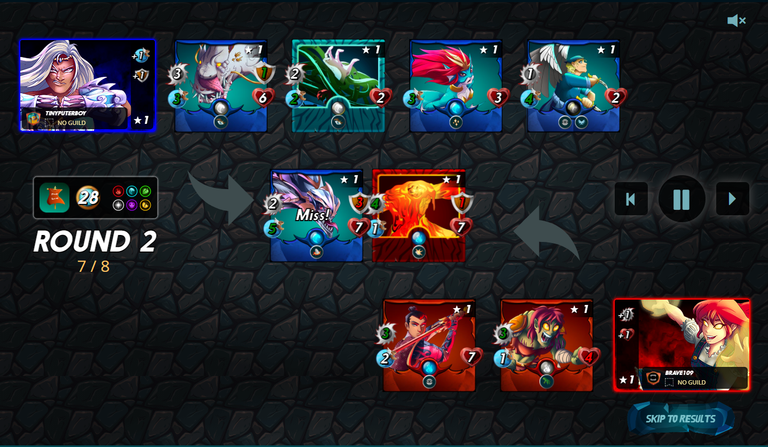

My team was just too fast causing the firemen to miss often. Today, speed wins the day.
Add in just a little armor for the times when quick isn’t quite quick enough, and once again: water douses fire.


As this match illustrates, the Deeplurker is a force to be reckoned with. Surviving the whole match in my backfield, it meted out a steady stream of 3-damage hits into my opponent’s backfield, quickly turning it into swiss cheese. And then, it turned its attention to the Living Lava, pouring cold water on its chances of survival as well. But that’s just what it does, and that’s exactly why this card sees so much play.
